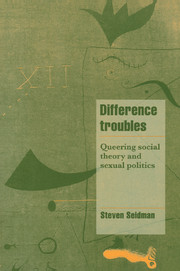Book contents
- Frontmatter
- Contents
- Preface
- Acknowledgements
- Introduction: the contemporary reconfiguring of social theory
- Part I Resisting difference: the malaise of the human sciences
- 1 The political unconscious of the human sciences
- 2 The end of sociological theory
- 3 Relativizing sociology: the challenge of cultural studies
- 4 The refusal of sexual difference: queering sociology
- 5 Difference troubles: the flight of sociology from “otherness”
- Part II Engaging difference: from lesbian and gay studies to queer theory
- Part III Democratic prospects: the politics of knowledge and identity
- Epilogue: pragmatism, difference and a culture of strong democracy
- Notes
- References
- Index
5 - Difference troubles: the flight of sociology from “otherness”
from Part I - Resisting difference: the malaise of the human sciences
Published online by Cambridge University Press: 05 October 2010
- Frontmatter
- Contents
- Preface
- Acknowledgements
- Introduction: the contemporary reconfiguring of social theory
- Part I Resisting difference: the malaise of the human sciences
- 1 The political unconscious of the human sciences
- 2 The end of sociological theory
- 3 Relativizing sociology: the challenge of cultural studies
- 4 The refusal of sexual difference: queering sociology
- 5 Difference troubles: the flight of sociology from “otherness”
- Part II Engaging difference: from lesbian and gay studies to queer theory
- Part III Democratic prospects: the politics of knowledge and identity
- Epilogue: pragmatism, difference and a culture of strong democracy
- Notes
- References
- Index
Summary
As a discussant on a panel addressing the issue of conceptualizing “difference” in sociology, I responded to four panelists who defended the re-centering of the disciplinary culture of sociology around the notion of social and cultural difference. Despite their intention, however, I argue that these panelists, like most of their colleagues, fail to imagine difference as “otherness” because they do not challenge the core “Enlightenment” premises of their own standpoint. Assumptions such as the unity of the self and “humanity,” Western modernization as social progress, and the equation of reason with Western scientific traditions suppress or pathologize difference, render difference into a temporary or transient condition, or figure social differences as stages of development towards a higher, unitary social endpoint.
I reprint this brief critical commentary because it illustrates prominent conceptual approaches to the question of difference among sociologists. I consider this discussion especially indicative of the failure of sociology in this regard in that the panelists I responded to are advocates of a sociology attentive to social difference. I criticize them because, like those they criticize, these sociologists refuse an epistemological de-centering that seems implicit in their own positions.
I have decided to keep the identities of the panelists anonymous since their papers were works-in-progress and they were not given the opportunity to respond to my comments. Moreover, it is less their specific points of view that are of interest than the general positions they stake out on the question of difference. What follows is the text of my critical commentary of four panel presentations.
- Type
- Chapter
- Information
- Difference TroublesQueering Social Theory and Sexual Politics, pp. 97 - 106Publisher: Cambridge University PressPrint publication year: 1997

